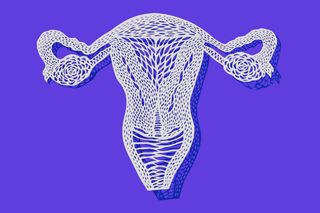
Women Are Finding Their Own Ways to Manage PCOS
What happens when standardized treatments meet a highly individualized, barely understood condition.

Earlier this year, we published a piece on how confusing it can be for women to navigate PCOS. Despite how common it is, there is no consensus on the root cause for PCOS. There’s also no cure for it, nor a way to prevent it.
“It’s a metabolic disorder and you can only control it, never cure it completely,” Dr Suchitra Dalvie told us. “Once your body has manifested it, you’re likely to live with it your entire life. I think that’s what intimidates people.”
It’s tough to figure out how to control the symptoms of PCOS, such as irregular periods, cystic acne, weight gain, unruly face and body hair, and hair loss. Conflicting advice from friends, family, and experts doesn’t help. Usually, the first course of action is the birth control pill, which most gynecologists prescribe as a way to help manage some of these symptoms.
But the pill has side effects and prevents conception, so many women look for other options — and those options may not necessarily work for everyone. “PCOS has variations of physical manifestations,” Dr. Duru Shah told us. “And every woman is different – there’s no one treatment for everybody.”
“I think it’s very easy to get overwhelmed, because a gynecologist will tell you something different, a nutritionist will tell you something different, a health coach will tell you something different, and then [there are] all these blogs out there on PCOS wellness,” says Serena Vora, a woman with PCOS.
The Pill
Sarah Sham was diagnosed with PCOS when she was 15 — earlier than most women. After her first period, the second took six months to arrive. And when the third period took another six months, her mother took her to see a doctor. “We figured that my PCOS is quite bad; there were cysts on both the ovaries, and a significant amount of cysts,” says Sham.
At that point, Sham’s gynecologist put her on hormonal birth control, which induced an artificial but regular period and prevented the onset of any PCOS symptoms. “I was on it for like, seven or eight years,” Sham says. “Every year after that, I tried to get off the pill, because I just didn’t want to be on it for the rest of my life.”
Even though it’s usually effective in removing the symptoms, many women have reservations about birth control as a treatment for PCOS, in part because it isn’t a solution. “It helped me in terms of my bleeding and regularity of periods, but the cysts were still there,” says Aartii Khuraana, who is no longer on birth control.
Others have trouble with the side effects. “I personally think [birth control] doesn’t suit me, like, I feel nauseous,” says Serena Vora. “Over the years I’ve decided I don’t want to have any kind of hormonal medication, because it does mess with your body’s chemistry.”
Lifestyle
Rachita, who asked to be identified by her first name, found that a change in her heavy-stress lifestyle was what helped her. She initially figured out something was wrong in her first year of college in the US, when she stopped getting her period completely.
Rachita learned she had PCOS when she did tests back home in Mumbai. After trying a few forms of birth control that made her body mimic a period, she stopped taking it. “It was too intense for my system, I was depressed, it just wasn’t working,” she says. “For a while I just wasn’t getting my period, and I was like, screw it.”
Finally, after graduating college, she ended up seeing an endocrinologist who advised her to regularize her lifestyle. He told her that if she wanted to see results, she needed to address the PCOS at its root. “He was like, your life is too stressed, you just need to calm down, you need to moderate,” she says.
Paying more attention to when she was eating and sleeping became easier after leaving college. “I just made sure I was eating at the same times, you know, just things that a normal, functioning human being does, which I think you don’t do as much in college,” Rachita says. “I don’t even think I did anything dramatically different, I think it was just being more mindful and just being outside a college environment, which was competitive, stressful, all of those things.”
Within a month or two of paying more attention to regular meal and sleep times, working out, drinking less, and eating better, Rachita got her period. It’s been regular since then, and she has no other symptoms, even though she still has PCOS. “Sometimes we tend to view stress as an emotional or mental thing, but it’s also day-to-day, it’s stress on your physical body,” she says. “I managed to address that.”
“But [before that] I didn’t get my period for four years,” she says.
Diet
For other women, a solution is not as clear-cut. Aashni Shah, who knew she didn’t want to go on birth control, has attacked her PCOS from multiple angles. When she was diagnosed, she hadn’t gotten her period in three months, and she noticed hair growth on her face and weight gain.
An endocrinologist identified her insulin resistance, which, along with diabetes, is thought to be linked to PCOS. He prescribed her Glycomet, a tablet used to control blood sugar levels in people with type-II diabetes. Women can also be also prescribed Metformin, another anti-diabetic tablet, for their PCOS.
Shah says she’s been working out and eating clean for a few months, and has noticed a tangible drop in weight and was able to put on muscle. “I’m working on losing weight and eating clean to help also get my hormones regulated, but as you know it’s that much tougher with PCOS, but not impossible,” says Shah.
For Shah and many others, watching what you eat is a big part of managing PCOS. Serena Vora discovered that her symptoms are more manageable if she cuts certain foods out of her diet. “For me, I know that whenever I avoid dairy, I feel much better,” she says. “My acne kind of goes away.”
“A lot of people say to avoid dairy because we’re not getting the right kind of milk, the milk that we get and the yogurt that we get is all… There’s hormones injected into that,” says Vora. “For me, that personally has worked, for other people, they don’t have a problem, they can have milk, [they won’t] have an issue, or it doesn’t affect them.”
“I tend to try and avoid sugar, but I have a sweet tooth, so that’s very difficult. When I do avoid sugar, it does help a lot, also,” she says. “Avoiding alcohol as much as possible has helped a lot.”
Vora has also realized she at risk for a thyroid disorder, another condition linked to PCOS. She turned to natural cures for managing her thyroid. “I did homeopathy, which kind of helped bring the thyroid levels down, which kind of helped your hormones balance as well,” she says.
Alternative Medicine
Girija Shivakumar tried multiple methods to manage her PCOS, but she believes homeopathy is what made it go away entirely. “It’s really been able to help me,” she says.
“Most homeopaths, they get into great detail about you, your tastes and preferences, what you like to eat, what your personality is. It’s very holistic, as opposed to very targeted, chemical-based, allopathic medicine,” says Shivakumar.
Since being diagnosed, Shivakumar has been regular with her ultrasounds. After starting homeopathy, her PCOS stopped showing up. “They always tell you that it’s a slow and steady process, so it’s not like taking a five day antibiotic course,” she says. “But you do see sustained results, and I pretty much have seen them.”
She’s not the only one: After having a “terrible” experience with Finasteride, a hormonal drug prescribed for her hair loss, Annuja S Sanghvi turned to a host of alternative healing practices to manage her PCOS.
In addition to losing weight and taking Metformin, which Sanghvi says “definitely helped,” she’s been doing reiki, feng shui, past life healing, and grounding, which involves walking barefoot on the earth. Small studies have suggested some forms of grounding, such as walking and sleeping on conductive material, may reduce cortisol rhythms, improve sleep, and manage stress levels.
Alternative healing is “slower, no doubt, than chemicals,” Sanghvi says. But she believes it’s helped her. “It’s been a journey of self discovery and trial and error,” she says. “Going all chemical to much more natural has been my journey over the last decade and it’s worked well in several areas at once.”
Aartii Khuraana tried access bars last year, and says they’ve helped her PCOS a lot. “The Access Bars are 32 bars of energy that run through and around your head that connect to different aspects of your life,” she says. “Touch one Bar and you begin to clear away the energy locked up in that area or aspect of your life just by touching it.”
She’s been practicing access bars since she learned about them last year. She’s also started working out. “My bleeding, which for the longest time was only two days, is now four days,” she says. “I feel happier.”
Screen Time
Sarah Sham, the woman who was diagnosed when she was just 15, was at a loss about her PCOS. She felt like she’d tried everything. She’d tried numerous natural treatments, but each time she would go off birth control, she’d notice “the most ridiculous acne and hairfall.”
“I cannot understand how I could be any healthier or do anything more than like, one and a half hours in the gym every single day, and watching every single thing I eat,” she says. “There is nothing healthier than this I could do.”
“I’ve met every single gynac in Bombay, because I want to do this naturally, and I don’t want to have to pop a pill every day,” says Sham.
A holistic endocrinologist recently told her to stop watching TV and using her phone after 8pm. “I found this to be really ridiculous at first, because I was like, how is this related,” says Sham. “Basically, what [the endocrinologist] said is that melatonin, which is the hormone that gets released when you sleep, is found in the same pituitary gland from which a lot of your gynecological hormones are secreted.”
Sham tried it for three weeks. To her surprise, it seemed to work. She slept better than usual, and her PCOS symptoms started clearing up. “It actually sounds so stupid, like, ‘Don’t watch TV,’ but I felt like it actually did work,” says Sham. “The acne and hair loss is the biggest one for me, and I definitely noticed less acne.”
She thinks, in addition to the potential connection between melatonin and testosterone production, that not looking at a screen every night calmed her down. “I think not watching TV in the night somehow just mentally calmed me, because I forced myself to do things like meditate, or read a book, or have a nice conversation with someone, which are somehow more calming than watching something loud on TV,” she says.
“Because my stress levels were reduced, and stress levels are obviously very related to your hormones as well, I do feel like that was the only thing that was a natural remedy that made some sense to me, or at least that I saw some results with.”
No Paved Paths
Nobody really knows why PCOS has suddenly started affecting women everywhere. And everyone seems to have wildly differing opinions on how to stop it in its tracks. Ultimately, however, the best treatment for PCOS is the treatment that works for each individual.
“One of the first things someone has to know is not to get overwhelmed by all of the information out there,” says Serena Vora. “You really have to try and test whatever [solution it is]. You can’t just go by what other people say. You have to really pay attention to how your body is reacting to certain things.”
Navigating PCOS, as Annuja S Sanghvi says, is a journey of self-discovery, one without a guide to show you the way. You’re the one drawing the map, so the only way forward is to try every course that makes sense to you — until you find something that sticks.
Urvija Banerji is the Features Editor at The Swaddle, and has previously written for Rolling Stone India and Atlas Obscura. When she's not writing, she can be found in her kitchen, painting, cooking, picking fights online, and consuming large amounts of coffee (often concurrently).
Related


Genetic Schizophrenia Risk Declines When the Mother’s Pregnancy Is Healthy
